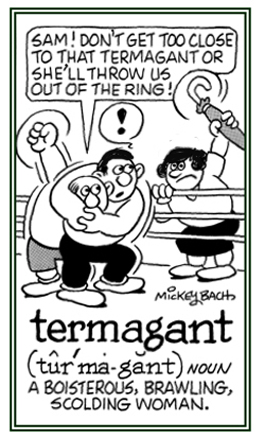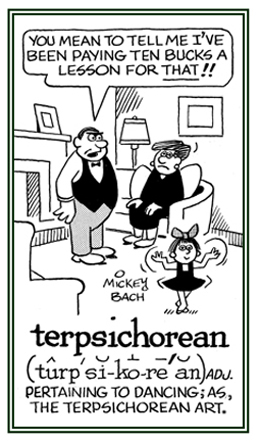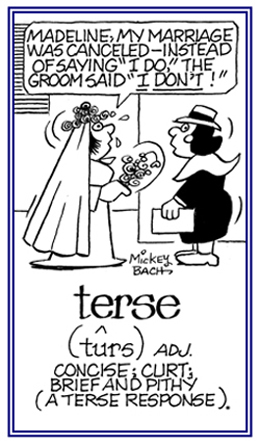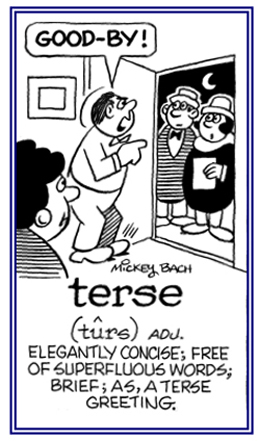English Words in Action, Group T
(a variety of English words which have developed through history and are currently used in our modern age)
Simply click on this banner (or the following link) and you will be on your way to stimulate your brain for greater word comprehension with quizzes based on some of the words in this unit.
2. An imaginary being of turbulent and brutal character, which frequently played a part in morality theater productions: It is said that Muslims worshiped Termagant, a fictitious deity with a fierce nature and which was presented in medieval mystery plays.
3. Etymology: from Latin tri-, "three" + vagari, "wander."

Go to this Word A Day Revisited Index
so you can see more of Mickey Bach's cartoons.
2. Etymology: from a combination of Greek terpein, "to enjoy, to delight" + khoros, "dance, dancing" resulting in terpsichore, "delighting in dancing."

Go to this Word A Day Revisited Index
so you can see more of Mickey Bach's cartoons.
2. An unfriendly and brief utterance; curt: The police officer's questions regarding the accident that Jake had were terse, short, and to the point.
3. Etymology: from Latin tersus, "wiped, polished", from tergere, "to be concise, to the point."


Go to this Word A Day Revisited Index
so you can see more of Mickey Bach's cartoons.
2. An object, animal, quality, etc., of any kind: People should respect all living things.
3. Something that occurs or which is done: The explosion was a terrible thing.
4. A particular event, an occurrence, or a situation: This was the worst thing that could have happened at this time.
This sunset is the most wonderful thing that Jamie has ever seen.
5. Objects that belong to someone; such as personal possessions or belongings: Marina is looking for a place to store her things.6. A matter of responsibility or concern: Tammy has several things to do before she can go home.
7. A person or an animal, that is often spoken of affectionately: When Ebony's dog came back after being in the rain, she told Mark that the poor thing was soaked to the bone.
8. Objects that are used for a particular activity: Henry's mother took out the things that she needed to bake some cookies.
9. Actions that are done, which will be done, or that will or need to be done: There are several things that Gary still needs to deal with.
10. Conditions which exist at a particular time and in a particular place: As things are now, Tim can't afford to buy a new car.
11. A fact or piece of information about something or someone: Irene said, "Greg, there's just one more thing that Andy needs to ask you."
12. Thoughts, ideas, or opinions: Don't say things that you will regret later.
Millie had some interesting things to suggest that could very well enhance the project.
13. A goal or a purpose: James said, "Well, Ronda, the objective now is to get the things that you need for the trip."14. A strong feeling of liking or disliking something or someone: Shelby has a thing against snakes and Jerry has a thing for women with red hair.
Mona thinks she knows the right answer.
Kelsey and Fay didn't think they would have any problems completing their project.
Brenda asked, "Gary, do you honestly think Alisha will agree with your plan?"
Stefanie never thought that she would become a computer programmer.
Who could possibly have thought that Cleo would be this successful?
Shareen never thought that Brian would leave her.
2. To have an opinion about someone or something: Willie thinks that he should let Iva know what is going on.Howard thinks that Trudy is a talented writer and musician.
Doug asked, "Mariel, where do you think we should eat tonight?"
3. To form or to have a particular idea or concept in a person's mind: Celia commented, "Come on, Eugene, you really should relax and try to think pleasant thoughts instead of being so negative."Craig was just thinking what it would be like to be rich.
Cassie was thinking about the time when she and her family took a vacation in Florida.
4. To use one's mind to understand or to decide something: Larry said, "Whatever you do, Frank, think before you answer the question."This word game teaches pupils how to think.
Janet said, "Where did I see your glasses? Let me think."
Ingrid thought for a long time before she reached a final decision.
Now, don't bother him because he's thinking about the problem.
Dwight inquired, "Well Carlos, have you thought about where you will be living when you retire?"
5. Used to make a statement or suggestion less definite: Ivan thinks Mollie and Janine lived here once.Victor thought that he might go for a walk in the city park this afternoon.
6. Applies to questions which show anger or surprise about what someone has done or is doing: Dad said, "Jimmy, what do you think you're doing? Your mother just said you can't have a cookie."Greg said, "Come on, man, who do you think you are, pushing your way in here like that?"
2. Anyone who studies ideas about knowledge, science, truth, etc.; such as, a philosopher or a scientist: Monroe was one of the great thinkers of his time.
Are there any real thinkers in Allen's company?
The teacher's attitude is to encourage her students to use their independent thinking.
Cindy asked, "Donald, do you remember what your thinking was when you made your decision?"
2. An opinion or judgment: Olive mentioned, "Carl, please let Maude know what your thinking is on this decision."3. A way of determining what is characteristic of a particular group, time period, etc.: Just what is the administration's current thinking about this topic in the current economic situation?
2. A careless mistake made when considering something which is often referred to as a blooper or blunder: As the proofreader for the publishing firm, it was Alice’s job to check for thinkos in the preliminary or rough copies.
Holly asked, "Do you people have any thoughts about what to do now?"
2. The act or process of considering: Henry was deep in thought about quitting his job and taking the new offer from the other company.Sherry wanted to give the suggestion that Travis made some thought before making a final decision.
3. A way of problem solving which is characteristic of a particular group, time period, etc.: There are two main schools of thought about this situation.2. That which is done or made after careful consideration: Maggie wrote a more thoughtful book about educational procedures than anyone had done before.
3. Showing concern for the needs or feelings of other people or creatures; being considerate: Helping the hundreds of pet dogs that were left behind by thousands of people when they left Detroit was one of the most thoughtful things that these volunteers could have done.
Hitting the woman with his car and then driving off without helping her was about the most thoughtless and illegal behavior a person could do.
2. A person who is morally or mentally enslaved by some power, influence, etc.: Mollie was a thrall to her professor’s towering intellect and prodigious writings and publications.
3. Etymology: Old English þrael, "bondsman, serf, slave", from Old Norse þraell, "slave, servant".
The throne was at first a stool or bench and later became an ornate armchair, usually raised on a dais and surmounted by a canopy which often became lavishly decorated.
Thrones have been made of a variety of materials, including wood, stone, ivory, and precious metals; in fact, Napoleon's throne was a gilded chair displaying eagles, lions, and other symbols.
2. The position of a king or a queen: The prince is next in line for the throne.The prince ascended the throne after the death of his father, who was the king.
Links to all of the groups of English words in action, Groups A to Z.
You may see the bibliographic list of sources of information for these words in action.


